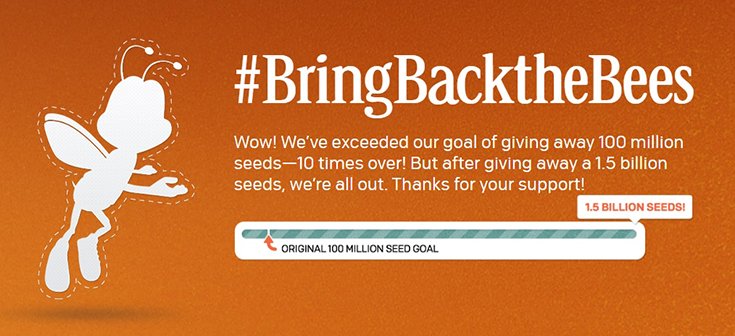General Mills Offers 100 Million Free Wildflower Seeds to #BringBacktheBees

People who recently purchased a box of Honey Nut Cheerios may have noticed something missing from the box: the Honey Nut Cheerios mascot, “BuzzBee,” is MIA. It’s a symbolic gesture aimed at drawing attention to the plight of bees. But General Mills (which makes Cheerios) says it doesn’t want to merely raise awareness, it wants to fix the problem. So, the company announced that it would give away 100 million wildflower seeds to buyers for free. [1]

The seeds, provided by Veseys Seeds, went fast, and is now fresh out of them. In the end, 1 billion seeds were given out, far surpassing their goal of 100 million. A map on the campaign’s website shows the vast majority of seeds were given out to people in the eastern U.S. The campaign asked seed recipients to post a photo on social media with #BringBacktheBees – the name of the campaign.
The site offers some shocking statistics on the importance and downfall of bees:
- 1 in 3 bites of food we eat is made possible by bees and other pollinators.
- 42% of bee colonies in the U.S. collapsed in 2015.
- 70 out of the top 100 human food crops pollinated by bees. [2]

Read: List of Foods we will Lose if we Don’t Save the Bees
The campaign requests that once you receive the seeds, you plant them in a “bee-friendly” area, and offers planting and growing tips for the colorful flowers. General Mills says it, too, is planting countless wildflowers on its oat farms.
The site states:
“By 2020 our oat farms will host about 3,300 acres of nectar- and pollen-rich wildflowers, which are full of the nutrients bees and other pollinators need to stay strong.”

Additionally, General Mills invested $4 million in the Xerces Society, which is a pollinator conservation group. [3]
Populations of bees and other pollinators have tumbled in recent years, and in January the U.S. Fish and Wildlife Service announced it was adding the rusty patched bumblebee to the endangered species list.
The species was found on much of the East Coast and much of the Midwest in high numbers as recently as the 1990’s. Today, only scattered populations exist in 13 states – Illinois, Indiana, Iowa, Maine, Maryland, Massachusetts, Minnesota, North Carolina, Ohio, Pennsylvania, Tennessee, Virginia and Wisconsin — and the Canadian province of Ontario. Rusty patched bumblebee colonies have plummeted about 87% since the 1990’s. [4]
In September 2016, 7 species of yellow-faced bees native to Hawaii were placed on the endangered list.
The USDA said in a recent report that there were only 100,000 honeybee colonies in the U.S. in 2016 compared to about 4.5 million documented in 2006. The government first started recording bee colonies in 1989. At the time, there were nearly 3.5 million honeybee colonies in the U.S. [5]
Some Issues
Though while this campaign is a positive one, I still feel obligated to point just a few things out that you may not hear elsewhere. Firstly, General Mills uses tons of pesticides on our crops, contributing to multiple issues that directly affect our food supply and planet. What’s more, it would be great if the seeds given out were non-GMO, but unfortunately, they are not. Just a few things to consider.
Sources:
[1] USA Today
[2] Cheerios
[3] M Live
[4] Atlanta News Now
[5] Newsweek
